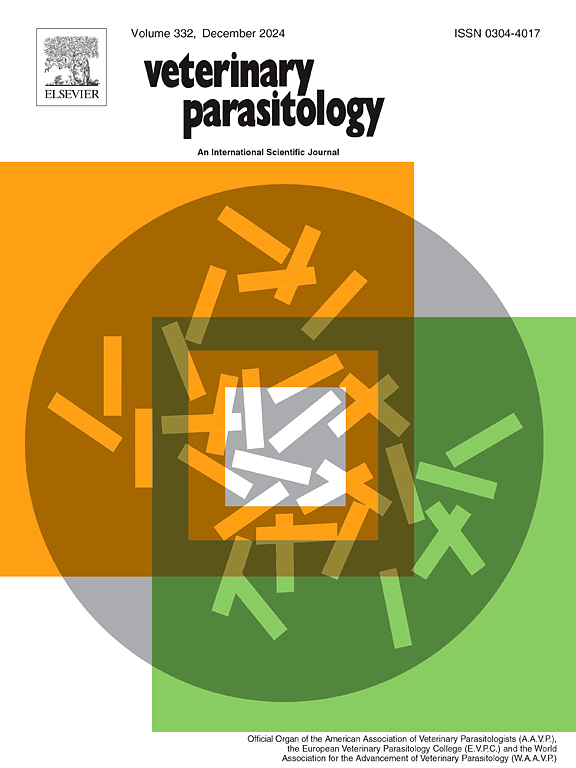The effect of β-Glucan induced intestinal trained immunity against Trichinella spiralis infection
IF 2
2区 农林科学
Q2 PARASITOLOGY
引用次数: 0
Abstract
Parasitic helminth Trichinella spiralis (Ts) induce mixed Th1/Th2 response with predominant type 2 immune responses, with protective immunity mediated by interleukin (IL)-4, IL-5, and IL-13. β-Glucan (BG) has been shown to have the ability to induce trained immunity, confers non-specific protection from secondary infections. However, whether BG-induced trained immunity played a role in protective type 2 immunity against Ts infection is unclear. In this study, BG was administered five days before Ts infection to induce trained immunity. Our findings demonstrate that BG pretreatment effectively reduced the number of T. spiralis adults and muscle larvae, whereas inhibition of trained immunity abolished the effect of BG. Additionally, we observed a significant increase in goblet cells and mucus production as evidenced by Alcian blue periodic acid-Schiff staining. Furthermore, quantitative real-time PCR analysis revealed a significant upregulation of IL-4, IL-5, and IL-13 expression in response to BG. Conversely, the inhibitor of trained immunity reversed these effects, suggesting that BG-induced trained immunity confers strong protection against Ts infection. In conclusion, these findings suggest that BG-induced trained immunity may play a role in protection against infections caused by other helminths.
β-葡聚糖诱导的肠道训练免疫对螺旋毛霉感染的影响
寄生蠕虫旋毛虫(Ts)可诱导Th1/Th2混合反应,其中2型免疫反应占主导地位,保护性免疫由白细胞介素(IL)-4、IL-5和IL-13介导。β-葡聚糖(BG)已被证明有能力诱导训练有素的免疫反应,并在继发感染时提供非特异性保护。然而,BG诱导的训练免疫是否在针对Ts感染的保护性2型免疫中发挥作用尚不清楚。在本研究中,在Ts感染前五天给予BG诱导训练免疫。我们的研究结果表明,BG预处理可有效减少螺旋体成虫和肌肉幼虫的数量,而抑制训练免疫则可消除BG的效果。此外,通过阿尔新蓝周期性酸-希夫染色法,我们观察到鹅口疮细胞和粘液分泌明显增加。此外,实时定量 PCR 分析显示,IL-4、IL-5 和 IL-13 的表达在 BG 作用下显著上调。相反,训练有素的免疫抑制剂可逆转这些效应,这表明 BG 诱导的训练有素的免疫可对 Ts 感染产生强大的保护作用。总之,这些研究结果表明,BG诱导的训练有素的免疫力可能在抵御其他蠕虫感染中发挥作用。
本文章由计算机程序翻译,如有差异,请以英文原文为准。
求助全文
约1分钟内获得全文
求助全文
来源期刊

Veterinary parasitology
农林科学-寄生虫学
CiteScore
5.30
自引率
7.70%
发文量
126
审稿时长
36 days
期刊介绍:
The journal Veterinary Parasitology has an open access mirror journal,Veterinary Parasitology: X, sharing the same aims and scope, editorial team, submission system and rigorous peer review.
This journal is concerned with those aspects of helminthology, protozoology and entomology which are of interest to animal health investigators, veterinary practitioners and others with a special interest in parasitology. Papers of the highest quality dealing with all aspects of disease prevention, pathology, treatment, epidemiology, and control of parasites in all domesticated animals, fall within the scope of the journal. Papers of geographically limited (local) interest which are not of interest to an international audience will not be accepted. Authors who submit papers based on local data will need to indicate why their paper is relevant to a broader readership.
Parasitological studies on laboratory animals fall within the scope of the journal only if they provide a reasonably close model of a disease of domestic animals. Additionally the journal will consider papers relating to wildlife species where they may act as disease reservoirs to domestic animals, or as a zoonotic reservoir. Case studies considered to be unique or of specific interest to the journal, will also be considered on occasions at the Editors'' discretion. Papers dealing exclusively with the taxonomy of parasites do not fall within the scope of the journal.
 求助内容:
求助内容: 应助结果提醒方式:
应助结果提醒方式:


